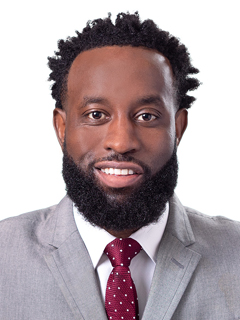HOW CAN WE HELP YOU? Call 1-800-TRY-CHOP
In This Section
AHQR Award, Penn Medicine Awards, $1.3 Million Donation, PKU, Cardiac Arrest

We begin November with awards to support patient-centered outcomes research and to recognize the valuable mentorship of researchers at Children's Hospital of Philadelphia. An abstract selected for the American Heart Association's Scientific Sessions reveals disparities in pediatric cardiac arrest, and clinical trials to advance neuroblastoma research receive a $1.3 million donation. Finally, new gene editing techniques utilizing CRISPR technology offer possibilities for PKU treatments.
AHRQ Award Supports Career Development in Patient-Centered Outcomes Research

Aditi Vasan MD, MSHP
Aditi Vasan MD, MSHP, a faculty member of PolicyLab and Clinical Futures, both CHOP Research Centers of Emphasis, received the Patient-Centered Outcomes Research Mentored Clinical Scientist Career Development Award from the Agency for Healthcare Research and Quality (AHRQ). The award is intended to foster the career development of promising new and mid-career/senior investigators in comparative effectiveness research methodology and applying these methods to patient-centered outcomes research.
"I am excited to have support from the AHRQ through this Patient-Centered Outcomes Research Career Development Award, which will focus on supporting children with chronic conditions and their families during the post-hospitalization care transition period," Dr. Vasan said. "I'm also very grateful to have excellent mentorship from Clinical Futures faculty members, including Dr. Alex Fiks, Dr. Chris Feudtner, Dr. Tyra Bryant-Stephens, and Dr. Chen Kenyon in carrying out this work."
This grant builds on Dr. Vasan's previous research, which has focused on implementing and evaluating social needs screening and referral programs, reducing administrative burdens to improve access to government benefit programs, and quantifying care coordination burdens among parents and caregivers of children with medical complexity. In the first ever pediatric adaptation, Dr. Vasan will use data from the evidence-based Individualized Management for Patient-Centered Targets, or IMPaCT, to develop family-centered interventions that address care coordination needs and unmet social needs.
Learn more about AHRQ's career development awards.
CHOP Researcher Honored With Penn Medicine Award of Excellence for Mentorship
The Perelman School of Medicine at the University of Pennsylvania announced its 2023 honorees for their Penn Medicine Awards of Excellence, which is a series of highly competitive awards that celebrate a commitment to excellence in teaching, leadership, and patient care. Congratulations to Babette Zemel, PhD, associate program director of the Center for Human Phenomic Science at CHOP, who received the Arthur K. Asbury Outstanding Faculty Mentor Award.
“Mentoring is the most rewarding part of my professional life, especially here at CHOP. Making the transition to becoming a successful, independent researcher is extremely challenging, and the training required cannot fully be attained from lectures or reading – it is experiential," Dr. Zemel said. "I am deeply gratified that I have extraordinary and very talented physicians and scientists to mentor here at CHOP and Penn, and that I am able to offer them the guidance and professional connections they need to establish their own research programs.”
Dr. Zemel's research aims to improve the understanding of lifelong health and how it relates to childhood antecedents of physical growth and maturation, body composition, population ancestry and genetics, and lifestyle factors. With a particular interest in bone fragility and obesity, Dr. Zemel has advanced her field with insights into the relationship between physical activity, diet, and muscle development to bone mineral accretion and pediatric bone health during early childhood through adulthood.
The Arthur K. Asbury award recognizes an individual who has fostered the professional development of other faculty members by providing inspiring and effective mentoring and sponsorship. The outstanding mentor helps to negotiate the complex demands of academic life, improve skills and opportunities, and reconcile the competing demands of work and home life.
Meet the rest of the 2023 Penn Medicine Awards of Excellence recipients.
Clinical Futures Director Receives Samuel Martin Health Evaluation Sciences Research Award
The Penn Medicine Awards of Excellence also recognized Alexander G. Fiks, MD, MSCE, an urban primary care pediatrician at CHOP, director of Clinical Futures, and an associate professor of Pediatrics at the Perelman School of Medicine at the University of Pennsylvania.
Dr. Fiks received the Samuel Martin Health Evaluation Sciences Research Award. Established in 1996 to honor the late Dr. Samuel P. Martin, III, executive director of the Leonard Davis Institute of Health Economics and chair of the Health Care Systems Unit of the Wharton School, the award is granted to a member of the School of Medicine faculty for a body of work with an emphasis on health services research.
Dr. Fiks has devoted his research career to better understanding and improving the performance of primary care pediatric services and improving outcomes for children. His work has advanced pediatric knowledge and practice by promoting judicious antibiotic prescribing and improving immunization rates.
His leadership in coordinating large-scale group and network projects also has had a significant impact in the field. Dr. Fiks is the director of the American Academy of Pediatrics Pediatric Research in Office Settings, a national research network, and he is medical director for the Pediatric Research Consortium, CHOP's practice-based research network, and co-director of the Possibilities Project, a CHOP initiative to innovate primary care delivery. Additionally, Dr. Fiks is a founding member of the hospital's Department of Biomedical and Health Informatics.
$1.3 Million Donation Will Fund Neuroblastoma Research
John Maris, MD, is the recipient of a $1.3 million donation collected during the Forbes-SHOOK Top Advisor Summit in Las Vegas to help end childhood cancer. The summit highlighted a campaign between SHOOK Research and the Minneapolis-based Children's Cancer Research Fund to finance the development of new diagnostic tests and better targeted therapies aimed at curing neuroblastoma.
Dr. Maris, an attending physician in the Division of Oncology at CHOP, investigates the molecular and genetic mechanisms contributing to the development and progression of neuroblastoma. The Maris Laboratory uses multidisciplinary approaches to develop new molecular diagnostic tests and less toxic, targeted therapies for relapsed or refractory neuroblastoma, with a major emphasis in immunotherapy discovery. The lab is also deeply involved in clinical trials through the Neuroblastoma Developmental Therapy Program, founded by Dr. Maris and now led by Dr. Yael Mossé.
Attendees of the summit heard from two teenagers currently undergoing treatment for neuroblastoma. Leo, who was diagnosed at age 7, and his family moved to Philadelphia from South Korea to participate in the clinical trials being conducted by Dr. Maris and his colleagues.
Learn more about the summit in this Forbes article.
New Gene Editing Techniques Suggest Significant Improvements for PKU Treatments
Two separate studies detailed new research from CHOP and the Perelman School of Medicine at the University of Pennsylvania that provide insight into potential treatments for phenylketonuria (PKU), a rare newborn genetic disease, using two forms of CRISPR gene editing – prime editing and base editing.
If left uncontrolled, PKU can lead to intellectual disability, psychiatric issues, and seizures. The first study, published in The American Journal of Human Genetics, explored a prime editing approach to correct the genetic variant responsible for this condition. Data from 129 individuals revealed those with a specific genetic variant called c.1222C>T in the phenylalanine hydroxylase (PAH) gene — the most common PKU-causing variant worldwide — had poor control over their metabolic condition. Prime editing in animal models revealed researchers could successfully correct the genetic PAH c.1222C>T variant.
The second study, appearing in Human Genetics and Genomics Advances, also focused on the same PAH c.1222C>T variant. PKU causes an amino acid — called phenylalanine (Phe) — to build up in the bloodstream. Using a gene-editing technique called base editing that precisely modifies a specific DNA sequence by replacing one DNA letter with another DNA letter, researchers found that when the selected base editor and guide RNA were delivered into animal models via lipid nanoparticles, Phe levels were normalized within 48 hours.
"These findings are a significant step forward in the treatment of PKU," said Rebecca C. Ahrens-Nicklas, MD, PhD, an attending physician at CHOP and a senior author of both studies. "While our results with animal models point us in the right direction, future research is needed to move these advances forward."
See this CHOP press release for more information.
Researchers Present Abstract Revealing Disparities in Pediatric Cardiac Arrest at AHA
Scientists from CHOP will present an abstract at the American Heart Association's (AHA) Scientific Sessions 2023 in Philadelphia that found a child's race and neighborhood could influence not only the likelihood of having a cardiac arrest but also survival and recovery.
"While much more work is needed to determine why we see these disparities, previous studies have shown that Black children receive less CPR after cardiac arrest. CPR is an important determinant in cardiac arrest survival," said Cody Gathers, MD, lead investigator and Critical Care fellow at CHOP. "The persistence of these disparities demonstrates a need for increased resources for these programs in higher-risk communities."
Researchers used the Cardiac Arrest Registry to Enhance Survival (CARES) database to analyze nontraumatic out-of-hospital cardiac arrest among children under the age of 18 between 2015 and 2019. Of 6,945 cases of out-of-hospital cardiac arrest, 33% occurred in Black children, 11% in Hispanic children, and 31% in White children. Black children were 26% less likely to survive hospital discharge. They also found that 41% of cases occurred in high-risk neighborhoods and that Black children had lower odds not only of survival but also of neurologically favorable survival compared to White children.
The AHA Scientific Sessions continue through Nov. 13; stay tuned for more coverage of additional CHOP presentations.
ICYMI
Catch up on our headlines from our Oct. 27 In the News:
- 'Cryptic' Viral Peptide Drives Large Part of Immune Response in Influenza A Virus Infection
- NICU Antibiotic Use Decreased Substantially in Past Decade
- Two Researchers Named 2023 STAT Wunderkinds
- Pediatric E-Scooter Injuries Rose More than 70% from 2020 to 2021
- Robert Grundmeier, MD, Receives Byron Oberst Award at AAP
Keep up with our news, stories, and updates in real time by following us on X, LinkedIn, or Instagram. Meet the minds behind the science in the Bench to Bedside podcast. Or subscribe to our newsletter to receive an email every other Friday by signing up here.







